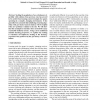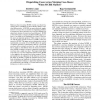666 search results - page 3 / 134 » When Similar Problems Don't Have Similar Solutions |
CEC
2005
IEEE
13 years 11 months ago
2005
IEEE
Abstract- Seeding the population of an evolutionary algorithm with solutions from previous runs has proved to be useful when learning control strategies for agents operating in a c...
ICCBR
1999
Springer
13 years 10 months ago
1999
Springer
Case-based problem-solving systems reason and learn from experiences, building up case libraries of problems and solutions to guide future reasoning. The expected bene ts of this l...
GECCO
2006
Springer
13 years 9 months ago
2006
Springer
When an evolutionary algorithm addresses a sequence of instances of the same problem, it can seed its population with solutions that it found for previous instances. This techniqu...
EUSFLAT
2007
13 years 7 months ago
2007
We generalize the solution of a multicriterial optimization problem which has been given in [5]. They have used a comparison of the criterion fuzzy preference relations and the ge...
FLAIRS
2003
13 years 7 months ago
2003
Multi-case-base reasoning (MCBR) extends case-based reasoning to draw on multiple case bases that may address somewhat different tasks. In MCBR, an agent selectively supplements i...


